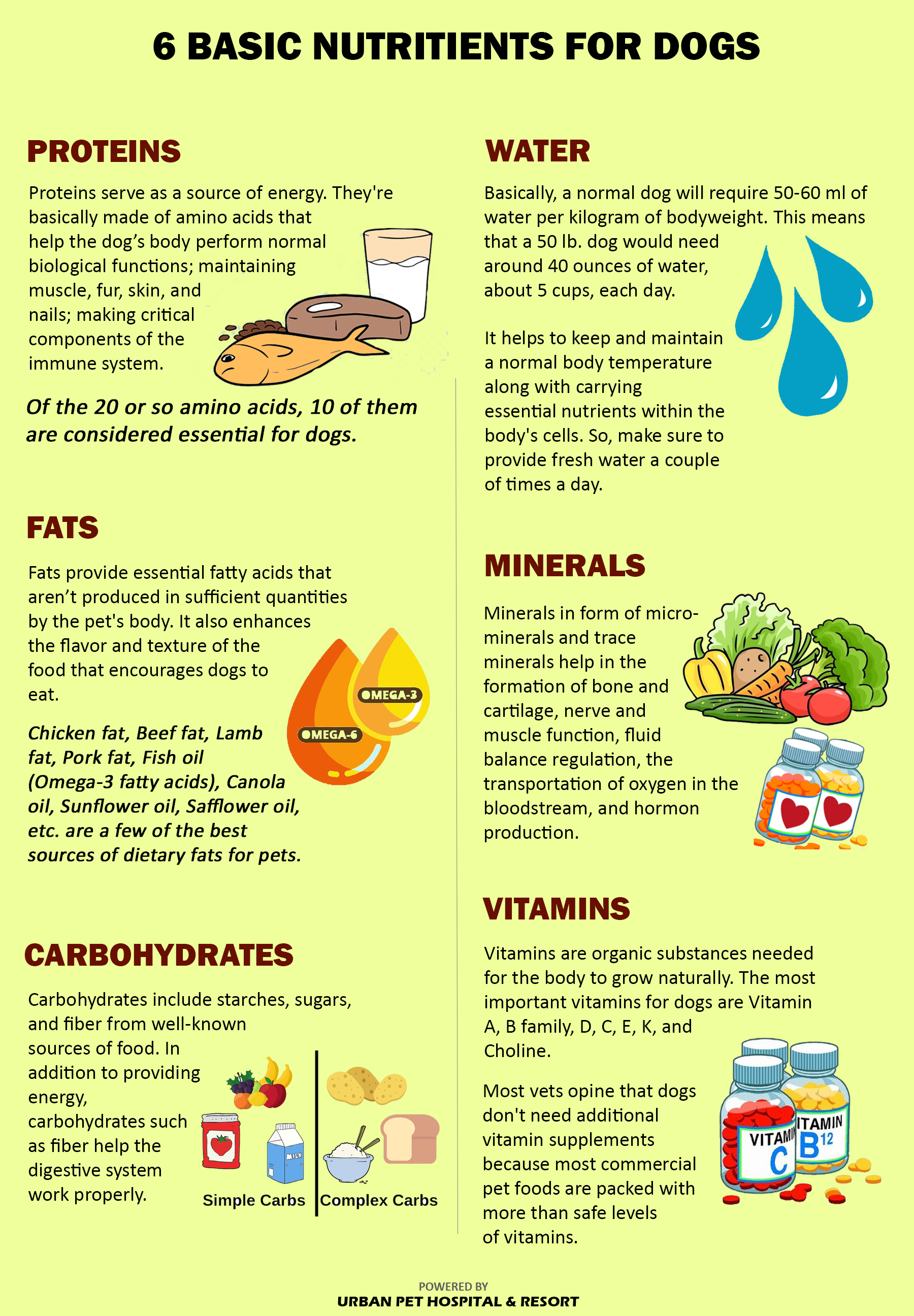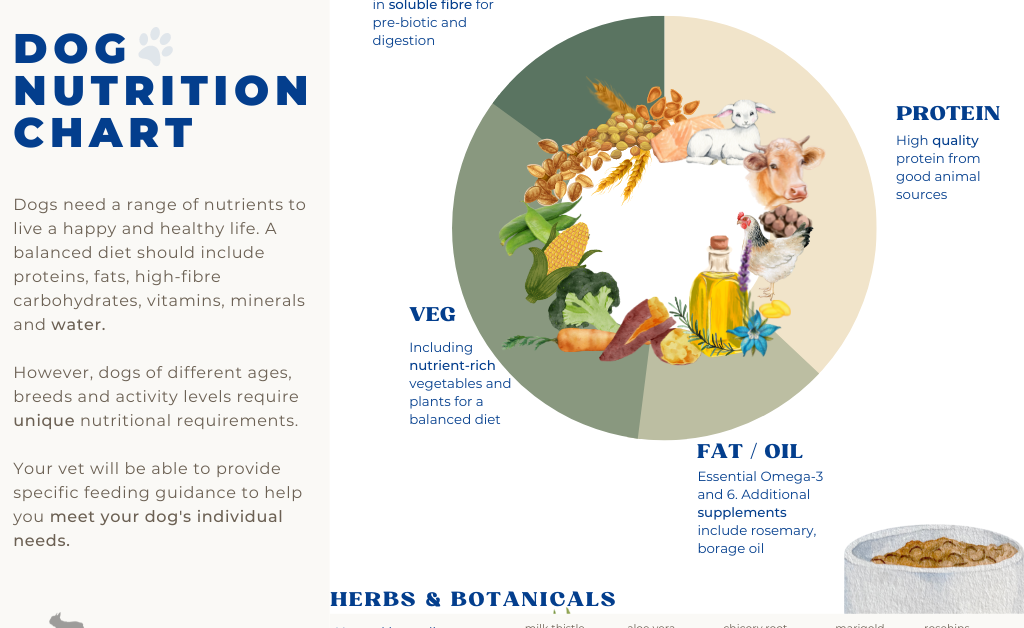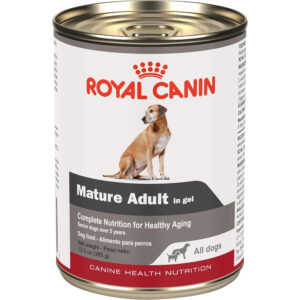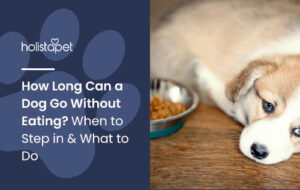Dogs, like humans, need a balanced diet to stay healthy. Their nutritional needs are specific and essential for their well-being.
Every dog owner wants their furry friend to thrive. Understanding what a dog needs in its diet is vital for overall health. Dogs require a mix of proteins, fats, carbohydrates, vitamins, and minerals. Each of these nutrients plays a unique role in maintaining a dog’s health.
For example, proteins help build strong muscles. Fats provide energy and support skin health. Carbohydrates can aid digestion. Knowing these needs helps you choose the right food. It also ensures your dog gets the best care possible. Let’s explore what goes into a dog's diet and how to meet these needs effectively.
Table of Contents
ToggleIntroduction To Canine Nutrition
Understanding a dog's nutritional needs is vital for their health. Dogs require specific nutrients to thrive. A balanced diet supports their growth, energy, and overall well-being. Knowing what dogs need can help pet owners make better food choices.
The Importance Of A Balanced Diet
A balanced diet is essential for dogs. It provides the right nutrients in the right amounts. Key nutrients include:
- Proteins: Build and repair tissues.
- Carbohydrates: Provide energy.
- Fats: Support cell function and energy.
- Vitamins: Aid in bodily functions.
- Minerals: Help with bone health and metabolism.
Each nutrient plays a specific role. Lack of any nutrient can lead to health problems. For example:
- Too little protein can cause muscle loss.
- Insufficient fat may lead to dry skin.
- Low vitamins can weaken the immune system.
Differences Between Canine And Human Nutrition
Dogs and humans have different nutritional needs. Dogs are omnivores but require specific nutrients. Here are some key differences:
| Nutrient | Dogs | Humans |
|---|---|---|
| Protein | Higher requirement | Moderate requirement |
| Carbohydrates | Can digest but not essential | Essential for energy |
| Fats | Needed for energy and skin health | Needed but in moderation |
Understanding these differences helps in selecting the right food. Always consult a vet for specific dietary advice. This ensures your dog gets the best nutrition.
Macronutrients For Dogs
Understanding a dog's nutritional needs starts with macronutrients. These are the main components of their diet. Dogs need a balance of protein, fats, and carbohydrates. Each plays a key role in their health.
Protein: Building Blocks For Health
Protein is vital for dogs. It helps build and repair tissues. Muscles, skin, and organs all rely on protein. Quality protein sources include meat, fish, and eggs. Dogs require amino acids, which are the building blocks of protein.
Some amino acids are essential. This means dogs cannot produce them. They must get these through food. Adult dogs need about 18-25% protein in their diet. Puppies need even more for growth.
Fats: Energy Sources And Essential Fatty Acids
Fats are another important macronutrient. They provide energy for daily activities. Fats also help absorb certain vitamins. Omega-3 and Omega-6 fatty acids are essential. They support skin health and reduce inflammation.
Dogs should get 8-15% of their diet from fats. Healthy fat sources include fish oil, chicken fat, and flaxseed oil. Too much fat can lead to obesity. Balance is key for optimal health.
Carbohydrates: The Energy Debate
Carbohydrates are a controversial topic. Some believe dogs need them, while others do not. Carbs provide quick energy. They can be found in grains, fruits, and vegetables.
Dogs can digest carbohydrates well. They can convert them into glucose for energy. However, their primary energy source should be protein and fats. A small amount of carbs can be beneficial.
Understanding your dog's needs is essential. Consult a vet for personalized advice. A balanced diet leads to a healthy, happy dog.
Vitamins And Minerals
Vitamins and minerals are crucial for a dog's health. They support growth, development, and overall well-being. Dogs need these nutrients in the right amounts. A balanced diet ensures they get what they require.
Vitamin Requirements For Dogs
Vitamins play various roles in a dog's body. They help with metabolism, immune function, and more. Here are some essential vitamins for dogs:
- Vitamin A: Important for vision and skin health.
- Vitamin B Complex: Supports energy production and brain function.
- Vitamin C: Acts as an antioxidant and helps in healing.
- Vitamin D: Essential for calcium absorption.
- Vitamin E: Protects cells and supports immune health.
Each vitamin plays a unique role. A deficiency can lead to health problems. Ensure your dog's diet includes these vitamins.
Essential Minerals For Bone And Teeth Health
Minerals are vital for strong bones and teeth. They also help with muscle function and nerve transmission. Key minerals include:
| Mineral | Function |
|---|---|
| Calcium | Strengthens bones and teeth. |
| Phosphorus | Works with calcium for bone health. |
| Potassium | Supports nerve and muscle function. |
| Magnesium | Aids in energy production and bone formation. |
Provide these minerals in your dog's diet. They are essential for maintaining strong bones and teeth.

Credit: www.barclondon.com
Water: The Essence Of Life
Water is vital for all living beings. For dogs, it plays a key role in health. Proper hydration helps maintain energy levels and supports vital functions. Without enough water, dogs can face serious health risks.
Hydration And Its Role In Health
Hydration affects many aspects of a dog's health. Here are some important points:
- It helps regulate body temperature.
- It aids digestion and nutrient absorption.
- It supports joint lubrication.
- It promotes healthy skin and coat.
Dehydration can lead to various health issues. Dogs may experience:
- Fatigue and lethargy
- Dry mouth and nose
- Loss of appetite
- Constipation
How Much Water Does A Dog Need?
The amount of water a dog needs varies. Factors include size, age, activity level, and diet. Here is a simple guideline:
| Dog Weight (lbs) | Water Needed (cups/day) |
|---|---|
| 10 lbs | 1 cup |
| 20 lbs | 2 cups |
| 50 lbs | 4 cups |
| 100 lbs | 8 cups |
Always provide fresh water. Monitor your dog’s drinking habits. If you notice any changes, consult your vet.
Life Stage Nutritional Needs
Dogs have different nutritional needs at each life stage. Their diets should change as they grow. Puppies need food for growth. Adult dogs need maintenance diets. Senior dogs require special care as they age.
Puppy Diets For Growth
Puppies grow quickly and need special diets. They need more calories and nutrients than adult dogs. Their food should be high in protein and fat. Here are some key points:
- Choose high-quality puppy food.
- Look for foods rich in DHA for brain development.
- Feed smaller, more frequent meals.
Check the feeding guidelines on the package. Follow the recommended amounts based on your puppy's weight. Regular vet check-ups help monitor growth.
Adult Maintenance
Adult dogs have different needs. Their food should maintain health and energy. Look for balanced diets with appropriate fat and protein levels. Here are important factors:
- Choose food based on your dog’s size.
- Feed twice a day for consistent energy.
- Monitor weight to prevent obesity.
Diet should include vitamins and minerals for overall health. Regular exercise helps maintain weight and muscle mass.
Senior Dogs: Adjusting For Age
Senior dogs have unique nutritional needs. Their metabolism slows down. They may gain weight easily. Here are some tips for feeding senior dogs:
- Choose low-calorie food to manage weight.
- Look for joint support ingredients like glucosamine.
- Increase fiber to aid digestion.
Consult your vet for specific dietary recommendations. Regular health checks are essential to adjust diets as needed.
Understanding these life stage nutritional needs helps keep your dog healthy. A well-balanced diet supports their growth, maintenance, and aging.

Credit: www.urbanpethospital.com
Dietary Considerations And Allergies
Understanding a dog's dietary needs is essential. Some dogs have special dietary requirements. Allergies and sensitivities can affect their health. Identifying these issues helps in choosing the right food.
Owners must pay attention to their dog's reactions to food. Common signs include itching, stomach upset, or changes in behavior. These signs often indicate food allergies or sensitivities.
Common Food Sensitivities In Dogs
Many dogs have food sensitivities. The most common allergens include beef, chicken, dairy, and wheat. Dogs can also react to soy and corn. Symptoms may vary from dog to dog. Some may experience skin problems, while others have digestive issues.
Identifying specific allergens is crucial. A vet can help determine what foods to avoid. A food diary may also help track reactions. This information guides you in selecting a suitable diet.
Hypoallergenic Diets
A hypoallergenic diet can help dogs with food allergies. These diets use limited ingredients. They often contain novel proteins like lamb or fish. This reduces the chance of allergic reactions.
Some hypoallergenic foods are made with hydrolyzed proteins. This process breaks down proteins into smaller parts. It makes them less likely to cause allergies. Always consult with a vet before starting a new diet.
Switching to a hypoallergenic diet may take time. Gradually introduce the new food. Monitor your dog's response closely. Adjustments may be necessary for the best results.
Feeding Practices
Feeding your dog is important for their health and happiness. Understanding the right practices helps ensure they get the nutrients they need. This section covers two main areas: commercial vs. homemade diets and meal frequency and portion sizes.
Commercial Vs. Homemade Diets
Choosing the right diet for your dog can be challenging. Both commercial and homemade diets have their pros and cons.
| Diet Type | Pros | Cons |
|---|---|---|
| Commercial |
|
|
| Homemade |
|
|
Meal Frequency And Portion Sizes
How often and how much you feed your dog matters. Follow these guidelines to help your dog thrive:
- Puppies: Feed 3-4 times a day.
- Adult dogs: Feed 1-2 times a day.
- Senior dogs: Adjust frequency based on health.
Portion sizes depend on your dog’s size and activity level. Use the following as a guideline:
| Dog Weight | Daily Food Amount |
|---|---|
| 5-10 lbs | 1/2 – 1 cup |
| 11-20 lbs | 1 – 1.5 cups |
| 21-50 lbs | 1.5 – 3 cups |
| 51-100 lbs | 3 – 5 cups |
Monitor your dog’s weight. Adjust food amounts as needed. Regular vet check-ups help keep your dog healthy.
Supplements And Superfoods
Dogs need balanced nutrition for health. Sometimes, regular food is not enough. This is where supplements and superfoods come in. They can help fill gaps in your dog's diet. They boost health and well-being.
When Are Supplements Necessary?
Supplements may be needed in various situations:
- Age: Puppies and senior dogs have different needs.
- Health issues: Dogs with certain conditions may need extra support.
- Diet restrictions: Dogs on special diets might miss essential nutrients.
- Recovery: After surgery or illness, dogs may need extra nutrition.
Consult a vet before adding supplements. They can recommend what is best for your dog.
Superfoods In Canine Nutrition
Superfoods are nutrient-rich foods that can enhance your dog's diet. Here are some popular superfoods:
| Superfood | Benefits |
|---|---|
| Blueberries | High in antioxidants. Good for brain health. |
| Sweet Potatoes | Rich in fiber and vitamins. Great for digestion. |
| Spinach | Packed with iron and vitamins. Supports immune health. |
| Salmon | High in omega-3 fatty acids. Good for skin and coat. |
Incorporating superfoods into your dog's diet can boost overall health. These foods add variety and taste. Always introduce new foods slowly.
The Raw Diet Debate
The raw diet for dogs is a hot topic among pet owners. Many believe it mimics a dog's natural diet. Others worry about safety and nutrition. This section covers the pros and cons of raw feeding. It also explains how to handle and prepare raw food safely.
Pros And Cons Of Raw Feeding
| Pros | Cons |
|---|---|
|
|
Safe Handling And Preparation Of Raw Food
Safety is key in feeding dogs raw food. Here are some important tips:
- Keep raw meat separate from other foods.
- Wash hands before and after handling raw food.
- Use clean cutting boards and utensils.
- Store raw food in the fridge or freezer.
- Thaw meat in the fridge, not on the counter.
Monitor your dog for any health changes. Consult with a vet before starting a raw diet. It is crucial to ensure your dog gets a balanced meal.

Credit: www.barclondon.com
Common Nutritional Myths Debunked
Many myths surround dog nutrition. These myths can confuse pet owners. Understanding the truth is important for your dog's health. Let’s debunk some common misconceptions.
Grain-free Diets: Fad Or Necessity?
Grain-free diets are popular among dog owners. Some believe grains harm dogs. This is not entirely true. Most dogs digest grains well. They provide essential nutrients and energy.
Dogs are omnivores. They can thrive on grains and meat. Grain-free diets may lead to nutrient deficiencies. Always consult a vet before switching diets. Balance is key to a dog's health.
The Truth About By-products In Dog Food
Many think by-products are bad for dogs. This idea is misleading. By-products can be nutritious. They include organs and other parts of animals.
These components often contain vital vitamins and minerals. They can be a good protein source. Not all by-products are the same. Quality matters. Always choose reputable brands for your dog's food.
Consulting With A Veterinary Nutritionist
Consulting a veterinary nutritionist is important for your dog's health. These experts understand the specific needs of dogs. They can help you create a balanced diet for your furry friend. This ensures your dog gets all the nutrients they need.
Veterinary nutritionists assess your dog's age, breed, and health. They provide guidance on food choices. They can also address any special dietary needs your dog may have.
When To Seek Professional Advice
Seek professional advice if your dog has health issues. Weight problems often require expert help. Changes in appetite or energy levels can also signal a need for advice. Puppies and senior dogs often need special diets. Consulting a professional ensures you meet their specific needs.
Creating A Tailored Diet Plan For Your Dog
A tailored diet plan considers your dog's unique needs. This plan should include the right balance of proteins, fats, and carbohydrates. A nutritionist will help you choose high-quality ingredients. They may suggest specific brands or types of food.
Regularly reviewing the diet plan is essential. Your dog's needs may change over time. Regular check-ups with the nutritionist can ensure your dog stays healthy.
Frequently Asked Questions
What Are The Main Nutrients Dogs Need?
Dogs require a balanced diet consisting of proteins, fats, carbohydrates, vitamins, and minerals. Proteins support muscle development, while fats provide energy. Carbohydrates aid digestion, and vitamins and minerals are crucial for overall health. It’s essential to ensure all these nutrients are included in your dog's meals.
How Much Protein Does A Dog Need Daily?
A dog’s daily protein needs vary by size and activity level. Generally, adult dogs require about 18-25% protein in their diet. Puppies and active breeds may need more, around 22-32%. Consult your veterinarian for specific recommendations tailored to your dog’s needs and lifestyle.
Can Dogs Be Vegetarian Or Vegan?
Yes, dogs can follow a vegetarian or vegan diet, but it requires careful planning. Ensure the diet contains all essential nutrients, particularly proteins and vitamins like B12. Consulting a veterinarian or a pet nutritionist is vital to avoid nutritional deficiencies and maintain your dog's health.
How Often Should I Feed My Dog?
Most adult dogs should be fed twice a day, while puppies may need three to four meals. Regular feeding times help regulate digestion and maintain energy levels. Adjust the frequency based on your dog’s age, size, and activity level for optimal nutrition and health.
Conclusion
Understanding a dog's nutritional needs is important for their health. Balanced meals help keep them strong and active. Focus on quality proteins, healthy fats, and essential vitamins. Always choose dog food suited for your pet's age and size. Regular vet check-ups can guide you in the right direction.
A well-nourished dog is a happy dog. Invest time in learning about their diet. Your furry friend deserves the best care possible. Make nutrition a priority for their well-being.














